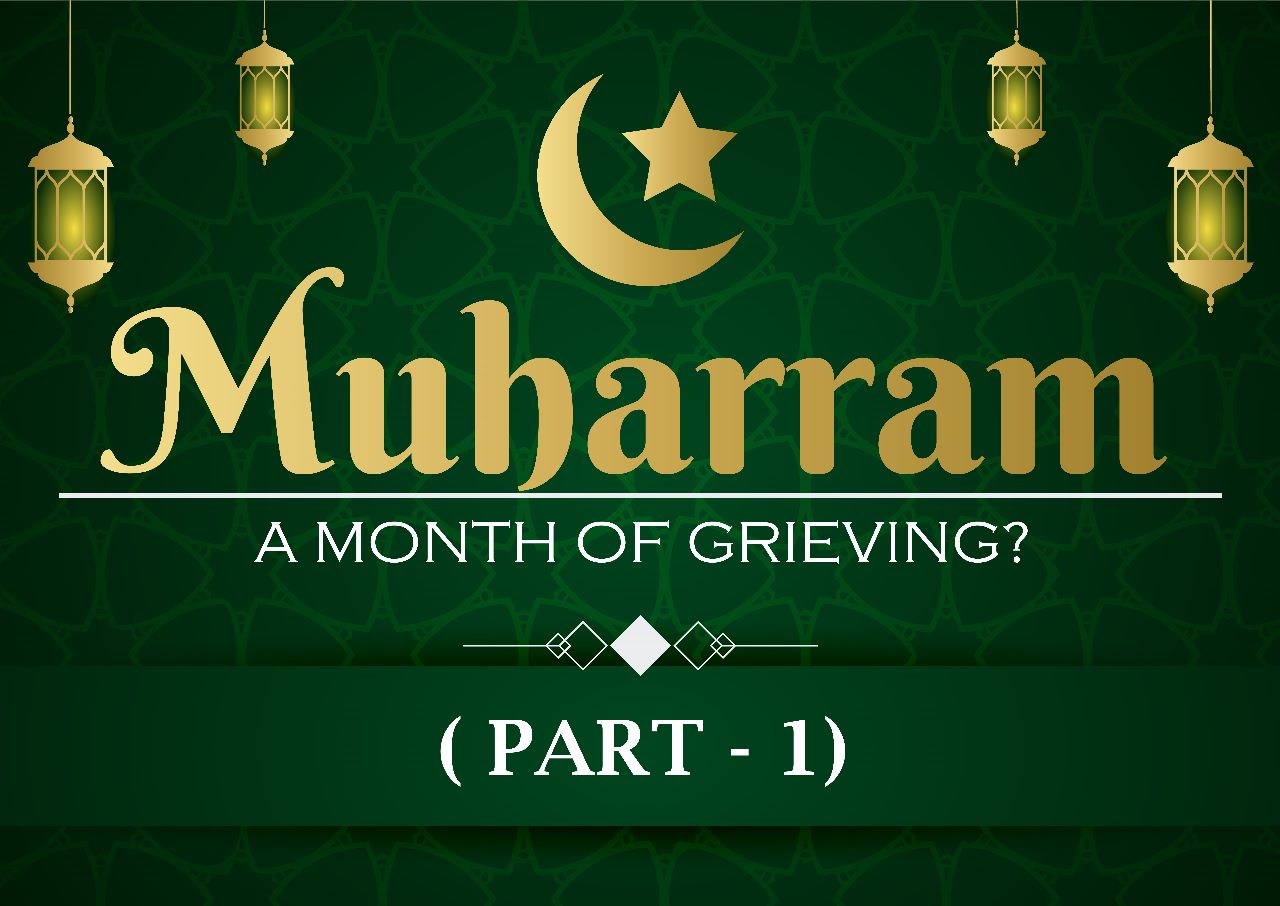Muharram is a blessed month. It marks the first month of the Hijri calendar and is one of the four sacred months. Sadly, this month, especially as witnessed in Pakistan is filled with practices of innovation and corruption. We see many crimes taking place during this month and additionally there are false practices and innovation that continue to occur throughout the month. This is how the Islamic calendar marks its advent.
Many people believe that since Muharram is when Hussain Bin Ali RadiaAllahu Anhu was martyred, it is a month of grieving. Wedding ceremonies or any other form of happiness should not take place during this month as Allah (عَزَّوَجَلَّ) has considered it sacred. The fact is that Allah (عَزَّوَجَلَّ) has not singled out Muharram as a month of sorrow and nor are there any other form of superstition regarding this month.
Duration of Grief
How long a Muslim can grieve is given to us in the Shari’ah. A hadith tells us:
لَا يَحِلُّ لِامْرَأَةٍ تُؤْمِنُ بِاللَّهِ وَالْيَوْمِ الْآخِرِ أَنْ تُحِدَّ عَلَى مَيِّتٍ فَوْقَ ثَلَاثٍ إِلَّا عَلَى زَوْجٍ فَإِنَّهَا تُحِدُّ عَلَيْهِ أَرْبَعَةَ أَشْهُرٍ وَعَشْرًا
The Prophet (ﷺ) said, “It is not lawful for a Muslim woman who believes in Allah and the Last Day to mourn for more than three days, except for her husband, for whom she should mourn for four months and ten days.”
(Sahih al-Bukhari 5339)
In another narration we learn, that Zainab (RadiAllahu Anha) said: I went to Um Habiba, the wife of the Prophet (ﷺ) when her father, Abu- Sufyan bin Herb had died. Um ,Habiba asked for a perfume which contained yellow scent (Khaluq) or some other scent, and she first perfumed one of the girls with it and then rubbed her cheeks with it and said, “By Allah, I am not in need of perfume, but I have heard Allah’s Messenger (ﷺ) saying, ‘It is not lawful for a lady who believes in Allah and the Last Day to mourn for a dead person for more than three days unless he is her husband for whom she should mourn for four months and ten days.'”
Similarly, when the son of Atiya (RadiAllahu Anha) passed away, we learn:
فَلَمَّا كَانَ الْيَوْمُ الثَّالِثُ دَعَتْ بِصُفْرَةٍ فَتَمَسَّحَتْ بِهِ
One of the sons of Um ‘Atiyya died, and when it was the third day she asked for a yellow perfume and put it over her body, and said,
“We were forbidden to mourn for more than three days except for our husbands.”
(Bukhari: 1279)
In another hadith:
Narrated Um ‘Atiyya (RadiaAllahu Anha):
“We were forbidden to mourn for more than three days for a dead person, except for a husband, for whom a wife should mourn for four months and ten days (while in the mourning period) we were not allowed to put kohl in our eyes, nor perfume our-selves, nor wear dyed clothes, except a garment of ‘Asb (special clothes made in Yemen). But it was permissible for us that when one of us became clean from her menses and took a bath, she could use a piece of a certain kind of incense. And it was forbidden for us to follow funeral processions.”
(Sahih al-Bukhari 5341)
For many, Muharram has been made a month of sorrow each year, whereas we learn from the above hadith that for a man there really is no grieving period. This is needless to say that it is a grieving period even for a woman as she is to grieve only for her husband a duration of what is given in the hadith. No person is to grieve for the death of a loved one for more than three days.
It has been several years since the death of Hussain bin Ali (RadiAllahu Anhuma), so to continue to grieve for his death is not permissible for neither a man nor a woman.
During Muharram, we witness many people walking around in black garments, they turn over the straw beds (char pai), refuse to wear shoes in a display of their sorrow. These are all acts which fall under the category of what the Qur’an states as:
عَامِلَةٌ نَّاصِبَةٌ ﴿٣﴾ تَصْلَىٰ نَارًا حَامِيَةً
Working [hard] and exhausted.They will [enter to] burn in an intensely hot Fire.
[Al-Ghashiya: 3- 4]
Black Dress
In a book called Man La Yahduruhu al-Faqih (al-Saduq, 10th century) which is a hadith collection by twelve Shia scholar, the scholar Imam Jaffar was asked about wearing a black topee (cap) during salah. He replied, “Do not wear a black cap during salah as it is the dress of the people of Jahannum (hellfire). This book is considered one of the kutub arba’a.
One of the Ameer ul Mu’mineen (RadiaAllahu Anhu) taught his companions to not wear a black dress as it is the dress of Fir’aun.
Muharram Wedding
As Muharram is considered a month of grieving, many people refrain from getting married during this month. Allah (عَزَّوَجَلَّ) has said in Surah An-Nur:
وَأَنكِحُوا الْأَيَامَىٰ مِنكُمْ وَالصَّالِحِينَ مِنْ عِبَادِكُمْ وَإِمَائِكُمْ ۚ إِن يَكُونُوا فُقَرَاءَ يُغْنِهِمُ اللَّـهُ مِن فَضْلِهِ ۗ وَاللَّـهُ وَاسِعٌ عَلِيمٌ
And marry the unmarried among you and the righteous among your male slaves and female slaves. If they should be poor, Allah will enrich them from His bounty, and Allah is all-Encompassing and Knowing.
[An-Nur: 32]
Those who are ignorant and unaware consider getting married during this month as a bad omen. We see a rise in weddings taking place right before Muharram. The cities in Pakistan are filled with weddings celebrations taking place. As soon as Muharram begins, suddenly the environment changes to a dark and dreary one.
Many scholars take this to be the correct view that no celebration should be carried on in this month. People blindly follow such deviant knowledge. In another hadith we learn:
‘I came to the Prophet (ﷺ) while I had a cross of gold around my neck. He said: ‘O ‘Adi! Remove this idol from yourself!’ And I heard him reciting from Surah Baqara: They took their rabbis and monks as lords besides Allah (9:31).
اِتَّخَذُوْٓا اَحْبَارَهُمْ وَرُهْبَانَهُمْ اَرْبَابًا مِّنْ دُوْنِ اللّٰهِ
They have taken their scholars and monks as lords besides Allah,
[At-Tawbah: 31]
He said: ‘As for them, they did not worship them, but when they made something lawful for them, they considered it lawful, and when they made something unlawful for them, they considered it unlawful.”
(At-Tirmidhi: 3095)
Hence we learn that we cannot just follow what people are saying without any reference to the authentic context and understanding of Deen.
Each and every person in the city from politics to media engrosses in this sorrow in some form or another. What is ironic is that during Ramadan, all sorts of programs on media continue on including musical shoes and what not, whereas that is considered the Holy Month and is filled with goodness of the Muslims fasting. It is essential that Ramadan may be considered the month of abstaining from all such vices. Yet, Muharram becomes this due to the lack of knowledge of the masses about what the month of Muharram really entails.
Many people believe that this is the month that Hussayn (Radiallahu Anhu) was martyred so we need to be sad. This incident took place about fifty years after the demise of the Prophet ﷺ, who before he left the world had indicated through a verse of the Qur’an that Deen was now complete:
۔
الْيَوْمَ أَكْمَلْتُ لَكُمْ دِينَكُمْ وَأَتْمَمْتُ عَلَيْكُمْ نِعْمَتِي وَرَضِيتُ لَكُمُ الْإِسْلَامَ دِينًا ۚ
This day I have perfected for you your religion and completed My favor upon you and have approved for you Islam as religion.
[Al-Maidah: 3]
Hence, there is no need to add on to any days or months of sorrow to what has already been completed and well-defined.











